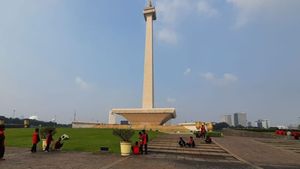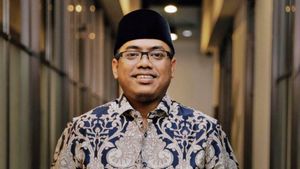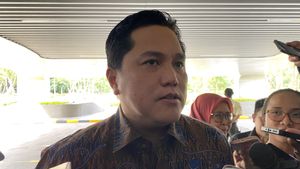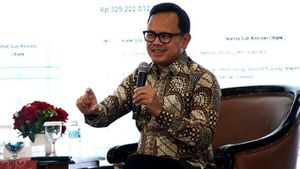JAKARTA - The proposal from the figure of the independence fighter Sukarni Kartodiwirjo to replace the word "Deputy of the Indonesian Nation" to "On behalf of the People of Indonesia" written through a typing machine on the draft text of the proclamation certainly has a deep meaning, especially in the people of Indonesia today. Symbolically, the change of words is a sign of closing the door of feudalism in Indonesia.
This is the first time in the history of the Indonesian state, said the nation or people have a very important meaning. The event of reading the text of the proclamation is a sign of the victory of the Indonesian people, not just representatives of the Indonesian nation.
The young writer from Minangkabau, Heru Joni Putra emphasized that 79 years of independence in Indonesia was actually a battle between the people and the representatives of the Indonesian nation, namely the fight between democracy and feudalism. Currently, Heru said, feudalism still exists today, of course with a new style. He added that as long as the feudal culture is still strong, the Indonesian people have never been truly independent even though de jure this country has been independent since 1945.
BACA JUGA:
"We are afraid to criticize superiors, lecturers for fear of being considered low or we cannot criticize people for having a debt of gratitude. That is a feudal culture, if democracy has no more thoughts like that, there are similarities in thinking," said Heru.
In 1926, Tan Malaka wrote the book Aksi Massa which said "In the feudal era, a person who has the blood of kings, even though he is stupid like a buffalo, 'can ride my ball with the help of priests and aristocrats', master the fate of millions of people.' Tan Malaka wrote against the phenomenon of feudalism thrives in the motherland. Historical records show that the way the colonialism authorities entered the archipelago by making kings as intermediaries in oppressing the small people. Kings that are willing to submit are inspired while continuing to be promoted. Colonialism preserves the feudal system, which continues until Indonesia is independent
The oligarchy (Egyptical: men's, Oligarkhmen) is a form of government whose political power is effectively held by small elite groups of society, either distinguished according to wealth, family, or military.
Fort Movement
Director of the Sabang Merauke Circle Institute, Syahganda Nainggolan, said that the first person in this nation to oppose the domination of non-intinuous oligarchy was Soekarno. According to Syahganda, Bung Karno wanted to make the Indonesian nation a master in his own country, not the slave nation. The policies and regulations issued always correct the oligarchy of the colonial group. The colonial oligarchies from the Netherlands, Europe and China have dominated trade in the archipelago for a long time.
"Bung Karno's policy is to correct the dominance of the Dutch, European and Chinese for hundreds of years to dominate trade in the archipelago. In addition, of course Bung Karno wants to make the Indonesian nation a master in his own country, not a slave nation. This is done by limiting non-investigating people from doing business to villages that reason to strengthen the indigenous economy," explained the activist who was born from Medan to VOI through a written message.
Soekarno's steps in 'sharing' national economic cakes by building indigenous entrepreneurs at the national level, such as TD. Pardede, Das'ad, Hasjim Ning, Muhammad Gobel, Hadji Kalla, Ahmad Bakrie, Soedarpo, and so on, in the Benteng Program policy.
Based on VOI's search, the Fort program or movement was initiated by the seventh Minister of Trade, Sumitro Djojohadikusumo in Natsir's cabinet in 1965. Sumitro launched economic policies in favor of indigenous entrepreneurs. This system is a revolutionary step in the economic history of the Indonesian nation. The reason is, this system responds to the Indonesian economy which is still influenced by the traces of the colonial system which tends to provide more benefits to the colonial population.
In the first three years after it was established, this fort movement has become a solution in accommodating more equitable protection and access for indigenous entrepreneurs. This program encourages economic transformation towards taking sides with local entrepreneurs, reducing economic disparities between colonial and indigenous population groups.
Unfortunately, this program failed due to weak supervision, so non-native entrepreneurs used indigenous entrepreneurs to dominate the economy. This gave birth to the term "a certificate," where import licenses are only sold on a table to well-established large business actors. VOI sources said, to close weak supervision, intelligence needs to be improved and a supervisory team is formed in the DPR and also in the Ministry of Finance.
Prabowo Turns On The Benteng Program
In the Prabowo government, poverty is still a big challenge. Based on data from BPS, as of March 2024, the poverty rate experienced a downward trend to 9.03 percent from 9.36 percent in March 2023. The poor population in March 2024 decreased by 0.68 million people from March 2023 so that the number of poor people became 25.22 million people.
Hashim djojohadikusumo (Photo: Antara)
"It's okay"
"It's okay"
"It's okay"
"It's okay"
According to Hashim Djojohadikusumo, this inequality and poverty is considered to be the reason President Prabowo is enthusiastic about carrying out the idea of the fort movement that was made by their father. "I testify, he (Prabowo) has repeatedly held a discussion, I can run the program from papi (Sumitro Djojohadikusumo). I can carry out the ideals and dreams of papa. We can run it," said Hashim at the Kadin Economic Dialogue with the Chairman of the Indonesian Chamber of Commerce and Industry Council at the Kadin Tower, Jakarta, last October 23.
Prabowo's policy to revive the Benteng Program was carried out through various concrete steps. One of them is to provide greater access to indigenous entrepreneurs in national strategic projects. This was proven by President Prabowo in a meeting with a delegation of Japanese businessmen at the state palace at the beginning of the first week of December. Prabowo confirmed the involvement of Haji Isam, Anindya Bakrie, and Arsjad Rasjid as representatives of indigenous entrepreneurs.
"Mr. Andi Syamsudin Arsyad, a prominent businessman from Kalimantan," said Prabowo.
Based on VOI observations, several ministers were also present to accompany Prabowo in the lunch. Minister of State-Owned Enterprises Erick Thohir, Minister of Industry Agus Gumiwang Kartasasmita, Cabinet Secretary Teddy Indra Wijaya, Minister of Foreign Affairs Sugiono, and Deputy Minister of Finance Suahasil Nazara also accompanied President Prabowo in a meeting with Japanese businessmen. Meanwhile, the JAPINDA Delegation, JJC, and representatives of the Japanese embassy who attended the Palace amounted to more than 50 people.
Coordinating Minister for the Economy Airlangga Hartarto said the meeting between Prabowo and the Japanese businessmen continued the meeting which was held on Thursday (5/12).
"Continuing yesterday's meeting with Japanese businessmen. Yes, maybe, there will be. In all, yesterday was not the whole delegation. Now all the delegates are all present," said Airlangga.
The English, Chinese, Japanese, Arabic, and French versions are automatically generated by the AI. So there may still be inaccuracies in translating, please always see Indonesian as our main language. (system supported by DigitalSiber.id)











